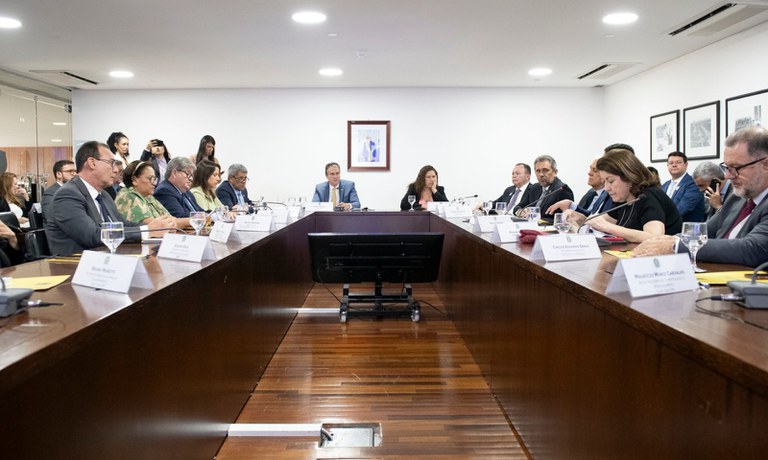Civil House, MEC and MGI received the region’s governors this Tuesday (24), at Palácio do Planalto

The federal government begins another work front with Brazilian states for new projects and partnerships. This time, the agendas involve the Civil House, the Ministry of Management and Innovation and the Ministry of Education. The objective is a task force to accelerate the issuance of the new national identity card and count on federal entities to adhere to education programs, with emphasis on the incentive and assistance scholarship for high school students, announced this Tuesday (24) by President Lula, on the program ‘Conversa com o Presidente’.
The Minister of Education, Camilo Santana, the Minister of Management and Innovation, Esther Dweck, and the executive secretary of the Civil House, Miriam Belchior, representing Minister Rui Costa, received the governors of the nine northeastern states at Palácio do Planalto, this Tuesday.
National identity card
The importance of Brazil having a unique registry to identify its citizens was highlighted by Minister Esther. She explained to state representatives that today, a citizen can be issued 27 identity cards, each with a different number.
“What President Lula has requested and wants to implement, since 2007, is a single national card, with a single number, regardless of the place where it was issued. In January of this year, the president sanctioned a law that defines CPF as this unique number”, stated the minister.
She pointed out that the responsibility for issuance remains the responsibility of the states and that the federal government is checking with each of the entities for assistance with funding, equipment, integration system with the Federal Revenue Service, or even technical support, depending on each person’s needs. Other consortia and/or groups of governors will also be called into this partnership.
According to the minister, the new identity card will have all the citizen’s biometrics. “The card will bring together citizen data from birth to death. And with this, the government will be able to get to know the Brazilian citizen, know each one’s needs for public policies, for more security and health.”
In addition, Secretary Miriam Belchior stated that the initiative for the new card also brings together the Ministries of Justice and Health. “It is work to ensure that we have a safe document, which allows citizens access to benefits and broad protection, including in the area of security, and in the prevention of banking fraud, for example”, he highlighted.
Education
Minister Camilo thanked the joint effort for programs such as “Literacy at the Right Age”, “Connected Schools” and advanced the MEC’s next major action so that young Brazilians do not drop out of school. “We are going to launch a scholarship for financial support for this young man who today abandons his studies to work. We can no longer lose the young people of this country. We need to guarantee the quality of learning and student retention”, emphasized the minister when announcing that President Lula has already announced this project and the official launch should take place in the next few days. The MEC will prioritize students enrolled in CadÚnico and the idea is that the scholarship will be focused, observing the different realities in Brazil.
Secretary Miriam Belchior added that without the support of state governments, programs like this will not reach their expected potential. “We are in dialogue today with the Northeast, the idea is that we will have new conversations with other groups and our assessment is that they are open to partnership, which is fundamental to the success of the new program already announced by President Lula.
The coordinator of the Northeast Consortium and governor of Paraíba, João Azevedo, stated that the states are interested in partnerships and that, specifically Paraíba, is already issuing the new card. “This process is very important, it is already advanced in several states and we want to accelerate emissions.” Regarding the scholarship for high school students, the Consortium coordinator said that the idea is to join forces. “We are going to work together, join forces with both federal and state resources so that we can achieve a unique result: keeping the student in school.”
Opinion
For the president of the International Identification Institute (InterID), Célio Ribeiro, it is essential that the CIN project is made known to as many government players as possible.
“This is our CIN. A State project that has in the Presidency of the Republic the vision of its importance and necessary implementation in the Country. We continue together supporting, among others, the Civil House of the Presidency of the Republic and the Ministry of Management and Innovation in Public Services – MGI, which are competently coordinating and operationalizing this large project. The knowledge and understanding of all state governments is fundamental, as in addition to building this National Identification System together, the Federation Unit has in the CIN a fundamental and important tool for local applications to serve its population in a specific way. This is a project that brings together, unites and respects federated entities. CIN, OUR GREATEST CITIZENSHIP INSTRUMENT.”




